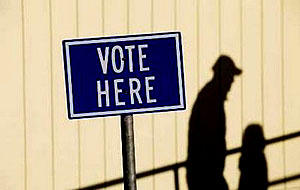 In the New York Times, Michael Shear explains how the Obama campaign is working to limit the damage from a wave of Republican laws that restrict voting rights:
In the New York Times, Michael Shear explains how the Obama campaign is working to limit the damage from a wave of Republican laws that restrict voting rights:
In Wisconsin, where a new state law requires those registering voters to be deputized in whichever of the state’s 1,800 municipalities they are assigned to, the campaign sent a team of trainers armed with instructions for complying with the new regulations.
In Florida, the campaign’s voter registration aides traveled across the state to train volunteers on a new requirement that voter registration signatures be handed in to state officials within 48 hours after they are collected.
And in Ohio, Mr. Obama’s staff members have begun reaching out to let voters know about new laws that discourage precinct workers from telling voters where to go if they show up at the wrong precinct.
The political motive behind these laws is pretty obvious: most of them have a disproportionate effect on minorities, students, and the poor, who vote for Democrats in large numbers. From a Republican point of view, the fewer of these folks who vote, the better.
As contemptible as this is, especially given the mountains of evidence that voter fraud is a minuscule problem in America, this article exposes the flip side of all this: more than likely, the Republican plan to suppress voter turnout won’t work in the long run. The effect of these laws is fairly small in the first place, and even that small effect will probably melt away as Democrats change their voter registration tactics. In states that require photo ID, Democrats will get aggressive about making sure potential voters have ID. In states with new restrictions on early voting, Democrats will change their tactics and concentrate more on election day. Etc.
None of this lets Republicans off the hook for their frankly loathsome efforts to suppress the votes of groups they don’t like. But it does mean they’re probably wasting their time. In the end, the impact is likely to be pretty small.








